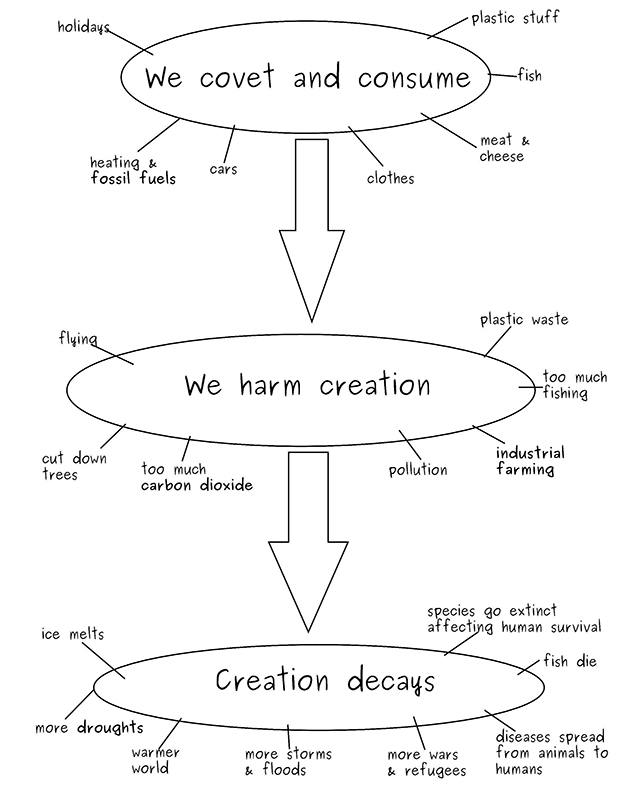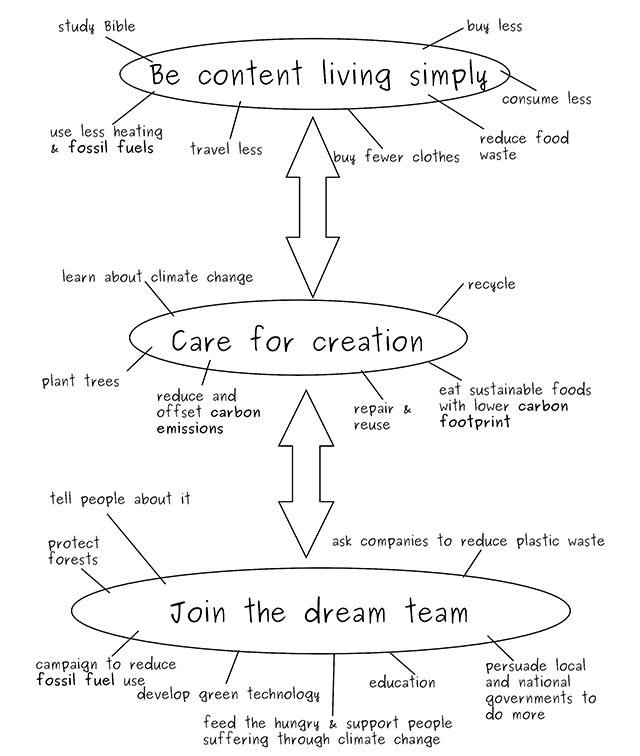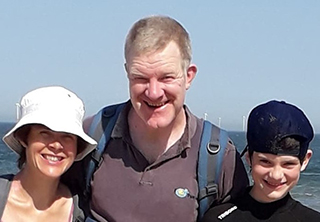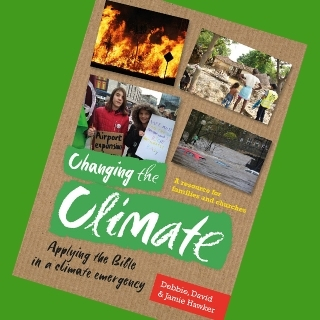As world leaders, policy negotiators and activists gathered in Glasgow continue to struggle to reach agreement on how best to tackle the climate emergency, our article this week is an edited extract from Changing the Climate, by the Hawker family…
7 November 2021
Changing the climate
‘I wish this book had been available when my children were younger,’ writes Dave Bookless, director of theology for the Christian environmental organisation A Rocha International. Lynne Norman of the Methodist children, youth and family team is also a fan: ‘I love the fact that this book is global, intergenerational and intersectional in its scope, while still remaining accessible and full of hope.’
Written by Debbie, David and Jamie Hawker, Changing the Climate helps engage families and churches with the Bible and motivates them to take action on climate change. Here, in an edited extract, they give eight key reasons why Christians should act, and act now.
Eight reasons to care for creation
1 Respect for the creator
Genesis 1 says that God created the earth, plants, animals and humans, and saw that they were good. God created a good creation. It is right to respect it.
Consider God the artist. God created an amazing world, with glorious sunsets, exquisite snowflakes, delicate flowers, awesome waterfalls and a huge variety of beautiful butterflies, birds and other animals. As the psalmist says, ‘The earth is the Lord’s, and everything in it’ (Psalm 24:1). Creation was made through and for Jesus (Colossians 1:16). God handed us the task of taking care of this amazing creation and adding our brushstrokes to the picture. We respect God by caring for creation.
2 God cares about creation
Seven times Genesis 1 says that God saw creation was ‘good’. God brought the animals to Adam to name each one; they were that important. Perhaps God was teaching Adam to value them individually, each worthy of a name, from the smallest to the largest.
God knows and cares about every bird, insect and animal. God cares deeply about creation. We are created in God’s likeness. Following God means caring about creation.
‘Following God means caring about creation.’
3 Failing to care for creation has devastating consequences
The United Nations Intergovernmental Panel on Climate Change (IPCC) includes hundreds of scientists from 195 countries. Repeatedly the IPCC has confirmed the climate is changing because of human activity. Dozens of countries have declared a climate emergency, but the amount of carbon dioxide in the atmosphere continues to rise. The need for action is urgent. The actions of humans today will have a huge impact on what sort of earth remains for the next generation.
Although the impact of climate change is generally worst in low-income nations, nowhere is immune. The year 2020 began with bush fires burning Australia, then Siberia and California burned in the summer. In February 2020, parts of Britain were flooded for the third time in a fortnight after unusually fierce storms. The same pattern is being repeated worldwide.
Creation in crisis

4 Love for neighbours and future generations
Worldwide, climate change is causing an increase in flooding, droughts, food insecurity, health problems and many other crises.
The apostle Paul urged us to offer ourselves as a living sacrifice (Romans 12:1). Making sacrificial choices to help limit climate change shows love for other people, including those who will come after us. The co-chair of the IPCC Working Group II has said, ‘The decisions we make today are critical in ensuring a safe and sustainable world for everyone, both now and in the future.’
The sixth commandment is ‘You shall not murder’ (Exodus 20:13). Our action or inaction related to climate change may cause death. If we continue to live in a way that accelerates climate change, without caring about those who will suffer and die as a consequence, then we are contributing to their pain and deaths. Do we think the lives of our children and grandchildren (or others) are worth less than ours? Caring for the environment in a way that helps to limit the devastating impact of climate change is one way of loving our neighbours.
‘Do we think the lives of our children and grandchildren (or others) are worth less than ours?’
5 Justice
The Old Testament mentions justice and related words over 900 times. It means looking after people who have little power. The ecological crisis is severely unjust. Our grandchildren will pay for the damage we have done. Even now, countries which have caused the least climate change are often the worst affected.
Rich countries have generally caused more climate change but will suffer less from it. They also have the money to help them do more about it. Nick Spencer and Robert White write:
‘People in high-income countries who have benefited historically from the burning of fossil fuels have a particular responsibility to deal with the results of their actions. And they can hardly claim to love their (global) neighbour when the consequences of their lifestyles may lead to suffering and an increased probability of an early death by people elsewhere. [That is] nothing less than sinfulness… putting oneself first… We need not only to repent of that but also to change our behaviour.’
6 God commands us to care for the earth
God’s first command to humanity, in Genesis 1:28, was ‘Be fruitful and increase in number; fill the earth and subdue it and rule over the creatures.’ Does that give us permission to plunder and destroy the earth’s resources? No. We are commanded to subdue the earth because it is wild, and we need to tame or manage it if we’re going to survive.
The word translated as ‘rule’ over the earth is the same word that describes the just and peaceful rule in the early days of King Solomon (1 Kings 4:21–24). It reflects the character and values of God’s loving and compassionate kingship. In The Message, the command is written as: ‘Be responsible for fish in the sea and birds in the air, for every living thing that moves on the face of the Earth.’ This idea of responsibility, or stewardship, fits well with the rest of the biblical narrative. The land belongs to God, and we are the tenants looking after it (Leviticus 25:23).
‘Our duty of serving and preserving creation is not an optional extra. It should be central to our worship.’
Our duty of serving and preserving creation is not an optional extra. It should be central to our worship.
7 An act of witness
Jesus commanded us to make disciples of all nations (Matthew 28:19), not converts only. A disciple follows Jesus and learns from him. Protecting the environment is an act of witness, demonstrating our faith through action. We can seek opportunities to tell people why we care about creation, as we share our faith.
8 Working in unity
Psalm 133 speaks of the blessing which comes from being in unity. Many Christian denominations have taken a stand on caring for the environment. Christians from different churches and denominations are working together for climate justice. Working together in unity is an act of witness.
Creation awaits the children of God

Conclusion: faith in action
Loving our worldwide neighbours involves more than telling them about Jesus. James 2:14–17 talks about putting our faith (what we believe in our heart) into action. James says if we don’t help people with their physical needs, our kind words are useless.
Would you continue on a path you knew would destroy your house and family? Climate change is destroying our brothers and sisters around the world. How will God judge those of us who take part in ruining the creation he told us to take care of?

The Hawkers are a Christian family who are taking action for climate justice. Psychologists Debbie and David Hawker work with Tearfund and mission organisations. Their teenage son Jamie also campaigns on climate issues and is part of the ‘Green Agents of Change’ initiative within the Methodist Church.

This workbook shows how the Bible is relevant to environmentalism, and how we can all play our part in limiting the negative effects of climate change. Each of the twelve chapters looks at a particular Bible passage, connects it with climate action, poses questions and suggests practical steps that can be taken.

Thursday 18 November 2021, 7.00 pm–9.30 pm online via Zoom
Advent can be a particularly busy time of year so why not take some time out just ahead of the season to slow down, unwind, and make room to reflect on the season to come.
Join our Advent book authors Amy Boucher Pye and Jo Swinney to hear fresh and thoughtful reflections on the Christmas story and how to make the most of our time this year. Singer-songwriter Lou Fellingham will be leading worship and Katie Norman of Messy Vintage will guide us in a special Christmassy craft.
